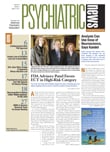People with schizophrenia who take their prescribed risperidone irregularly—even if the gaps in adherence are partial or brief—run an unexpectedly large risk of relapse of their positive symptoms, according to an article published in the January 4 American Journal of Psychiatry. The study, which points to the importance of cautioning patients about the possible consequences of antipsychotic medication nonadherence, was led by Kenneth Subotnik, Ph.D., a research psychologist and adjunct professor in the Department of Psychiatry and Biobehavioral Sciences at UCLA, and colleagues.
The authors observe that such nonadherence is a serious practical problem: Close to 50 percent of patients discontinue or fail to regularly take antipsychotic medication within one year of beginning treatment. Such patients run an increased probability of hospitalization, with all the attendant costs to the patient and to the health care system that hospitalization entails.
Most subjects in the study received risperidone, while the rest received other second-generation antipsychotic medications.
The subjects were psychiatric outpatients at the UCLA Aftercare Research Program in Los Angeles. One of the most challenging tasks the investigators faced was determining how strictly the patients were adhering to their medication schedule. The investigators used a combination of patient self-reports, clinician judgments, pill counts, and concentrations of medication in the patients' blood plasma. They followed the patients for 18 months, observing that 32 percent of patients took their antipsychotics as prescribed, while others were found to have mild (33 percent), moderate (16 percent), or severe (19 percent) nonadherence.
The study defined mild nonadherence as "compliance with 50 percent-75 percent of the prescribed oral risperidone dose for at least two consecutive weeks during the 18-month follow-up period." Moderate nonadherence meant taking less than 50 percent of the prescribed dose for two to four weeks, and severe nonadherence meant taking less than 50 percent of the prescribed dose for more than four weeks or dropping out of treatment.
The investigators found that "any period of mild or greater severity nonadherence was significantly predictive of return of psychotic symptoms." Even missing as little as 25 percent of the prescribed dosage over a period of two weeks raised the risk of symptom return. The mean time between the beginning of nonadherence and relapse in these patients was approximately two-and-a-half months.
While the current study is generally consistent with the previous research on first-episode schizophrenia, it extended these findings by operationalizing three levels of nonadherence.
Subotnik told
Psychiatric News by e-mail, "We wanted to get away from the common all-or-nothing characterizing of patients as either taking or not taking their medication, although we can't say in our study whether 75 percent adherence represented missing four days, or taking only 75 percent of the prescribed dosage every day during a 14-day period. . . . There has been a study where patients were given their medication every other day with no increase in relapse (see Schizophrenia Research Forum discussion on this topic, which we contributed to at <
www.schizophreniaforum.org/for/live/detail.asp?liveID=79>). So it is possible that the type or pattern of partial adherence might be relevant, but we did not have the fine-grained data to examine this question."
The article suggested that "the current clinical practice of prescribing the lowest amount of psychiatric medication to ameliorate symptoms while keeping side effects at a minimum might be contributing to a situation in which there is very little allowance for even partial nonadherence."
The authors also cautioned that many factors may influence patient nonadherence with medication. For example, "patients with a less than optimal response to an antipsychotic medication might be more likely to become nonadherent."
"A more fine-grained temporal analysis of the interplay of changes in symptoms, insight, and medication adherence will be necessary to disentangle these effects and will be the subject of future studies," they added.
Among the patients in the study, 63 percent had been diagnosed with schizophrenia; 18 percent with schizophreni-form disorder, 14 percent with schizoaffective disorder, depressive type; 2 percent with schizoaffective disorder, manic type; and 2 percent with psychotic disorder not otherwise specified.
The participants had an age, educational, and gender distribution typical of individuals with a first episode of psychosis. They also had a racial/ethnic background typical of the multiethnic Los Angeles area, with a mix of Caucasian, Hispanic, Asian, African-American, and mixed-race individuals.
